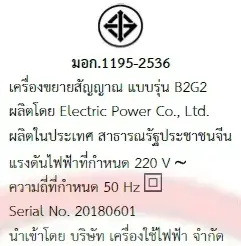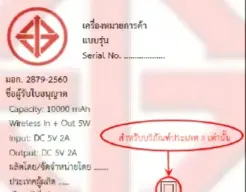
Introduction to Thailand's Mandatory TISI Certification
TISI stands for the Thai Industrial Standards Institute, the national standards organization of Thailand.
Established under the Ministry of Industry and in accordance with the Industrial Product Standards Act (B.E. 2511), TISI is the authoritative body responsible for standard development and standardization promotion throughout Thailand.
TISI issues Thai Industrial Standards (TIS) and implements certification schemes to ensure that products distributed in Thailand comply with national standards. Upon successfUL certification, a product receives a certificate issued by TISI, a process commonly referRED to as TISI Certification.
Types of Standards
TIS standards are divided into two categories:
Mandatory standards, which require the use of the TISI mandatory certification mark
Voluntary standards, which allow the use of the TISI voluntary certification mark
This document focuses on the mandatory certification mark.
Certification Process
TISI’s mandatory certification scheme follows ISO/IEC 17067 Type 5, which involves type testing, quality management system evaluation, and continuous surveillance of products during production and/or in the marketplace.
Applicants must submit product samples for type testing and pass a factory inspection before receiving certification.
There are currently four official TISI product certification bodies, all located in Thailand. Most testing laboratories, such as EEI and JETT, are also based in Thailand. Therefore, product samples must be sent to Thai labs for testing, and audits are conducted by Thai certification body representatives.
Common Mandatory TIS Standards
There are 122 mandatory TIS standards, with 42 of them covering electrical and electronic products, including household appliances, lighting, and other high-risk items.
Some frequently applied mandatory standards include:
TIS 1195-2536 (1993) – Safety of audio/video products (effective from August 31, 2002)
TIS 2217-2548 (2005) – Safety of lithium rechargeable batteries (effective from January 26, 2007)
TIS 2879-2560 (2017) – Safety of portable power banks (mandatory from November 16, 2020)
TIS 2235-2557 – Safety of single-capped fluorescent lamps (effective from February 24, 2018)
TIS 2337-2557 – Energy efficiency requirements for fluorescent lamp ballasts (effective from August 16, 2017)
TIS 1389-2559 – Safety of clothes dryers (effective from August 17, 2017)
TIS 1693-2547 (2004) – Safety of electric water heaters (effective from April 23, 2006)
TIS 1773-2548 (2005) – Safety of household MICrowave ovens (effective from August 21, 2007)
TIS 2062-2558 (2015) – Safety of electric kettles (effective from November 7, 2017)
TIS 1463-2013 – Safety of household washing machines (effective from September 26, 2017)
TIS 2214-2548 (2005) – Safety of household refrigerators (effective from December 23, 2006)
TIS 2186-2547 (2004) – Energy efficiency of household refrigerators (effective from December 23, 2006)
Labeling Requirements
TISI has issued a guide known as the TIS BOOK that outlines how mandatory certification marks must be displayed. The product label must include the following information:


1. The TISI mark and applicable standard number
2. Manufacturer’s name or trademark
3. Product name
4. Model number
5. Product specifications
6. Manufacturing date
Additional product-specific requirements may apply. For example, power banks must include warnings, charging guidelines, operating temperature range, and recycling symbols.
QR Code Labeling Policy
On September 3, 2020, TISI introduced a new policy requiring certification labels to include a QR code, which officially took effect on January 21, 2020.
Email:hello@jjrlab.com
Write your message here and send it to us
 How Do You Get a CE Mark
How Do You Get a CE Mark
 IEC 60529 IP Rating Ingress Protection Standard
IEC 60529 IP Rating Ingress Protection Standard
 IEC 60601-1 Medical Electrical Equipment Basic Saf
IEC 60601-1 Medical Electrical Equipment Basic Saf
 European Authorized Representative Medical Devices
European Authorized Representative Medical Devices
 EU Waste Electrical and Electronic Equipment Direc
EU Waste Electrical and Electronic Equipment Direc
 How to Get CE Approval
How to Get CE Approval
 Accelerated Ageing Test
Accelerated Ageing Test
 IP Ingress Protection Testing
IP Ingress Protection Testing
Leave us a message
24-hour online customer service at any time to respond, so that you worry!




